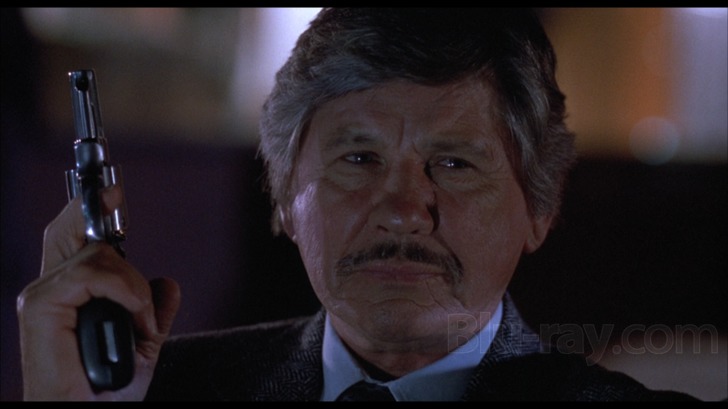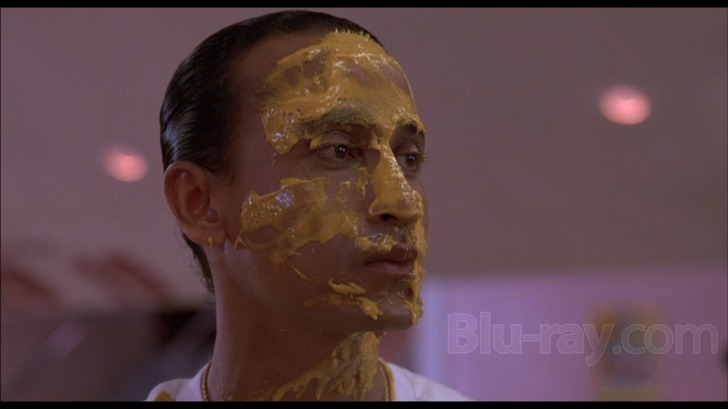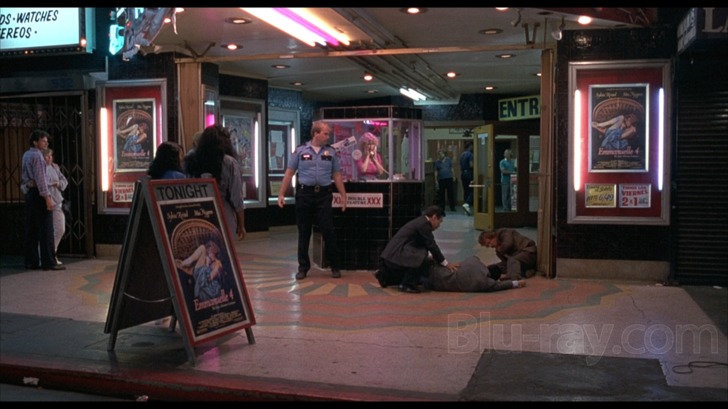Kinjite: Forbidden Subjects Blu-ray Movie
HomeKinjite: Forbidden Subjects Blu-ray Movie 
Olive Films | 1989 | 98 min | Rated R | Oct 27, 2015
Price
List price:Amazon: $22.70 (Save 24%)
Third party: $22.70 (Save 24%)
Only 3 left in stock (more on the way).
Movie rating
6.1 | / 10 |
Blu-ray rating
| Users | 4.0 | |
| Reviewer | 3.0 | |
| Overall | 3.0 |
Overview
Kinjite: Forbidden Subjects (1989)
A brutal Los Angeles police Lt. is determined to bust up an organization that forces underage girls into prostitution.
Starring: Charles Bronson, Perry Lopez, Juan Fernández (I), James Pax, Peggy LiptonDirector: J. Lee Thompson
| Crime | Uncertain |
| Thriller | Uncertain |
| Drama | Uncertain |
| Action | Uncertain |
| Mystery | Uncertain |
Specifications
Video
Video codec: MPEG-4 AVC
Video resolution: 1080p
Aspect ratio: 1.85:1
Original aspect ratio: 1.85:1
Audio
English: DTS-HD Master Audio 2.0
Subtitles
None
Discs
25GB Blu-ray Disc
Single disc (1 BD)
Playback
Region A (locked)
Review
Rating summary
| Movie | 2.0 | |
| Video | 3.5 | |
| Audio | 3.5 | |
| Extras | 1.0 | |
| Overall | 3.0 |
Kinjite: Forbidden Subjects Blu-ray Movie Review
Reviewed by Brian Orndorf March 3, 2016For their final collaboration, actor Charles Bronson and director J. Lee Thompson (who passed away in 2002) head into the darkness with 1989’s “Kinjite: Forbidden Subjects,” transporting their recipe for smashmouth filmmaking to the world of sexual exploitation. It’s a difficult subject matter to explore with any type of lightness, but the pair give the topic a B-movie shakedown, delivering a strangely insensitive take on the death of innocence that favors scowling and xenophobia from the star, who takes on the role of a determined cop with the same lukewarm passion he brings to every role. As well-intentioned as “Kinjite: Forbidden Subjects” tries to be, it’s missing a few great ideas and patience to truly understand the scourge of human trafficking, treating the topic with minimal interest in collateral damage. There’s plenty of Bronson being irritable, smacking around baddies and sassing superiors, but what the picture needs is respect for the crime, not more breakaway glass.

In the heart of Los Angeles, Lieutenant Crowe (Charles Bronson) is a tough cop who’s growing tired with the evil he encounters on a daily basis, including multiple run-ins with pimp Duke (Juan Fernandez), a vicious crook who’s organized a prostitution ring featuring underage girls. Coming home to the developing sexuality of his own daughter, Rita (Amy Hathaway), and the concerns of his wife, Kathleen (Peggy Lipton), Crowe is ready to retire. Hiroshi (James Pax) is a Japanese businessman who resents his wife’s (Marion Yue) inability to fulfill his extensive sexual desires, entertaining the idea of prostitutes to pacify his whirring mind. Transferred to L.A. by his company, Hiroshi’s eyes are opened to American permissiveness, even taking advantage of Rita during a bus trip. However, the respectable creep’s life is halted when his oldest daughter, teen Fumiko (Kumiko Hayakawa), is kidnapped and turned out by Duke, with Crowe called in to find the missing girl and take down the hoodlum for good.
“Kinjite: Forbidden Subjects” certainly gets introductions right, watching Crowe’s burn off his frustrations while tracking Duke’s business dealings, busting into a hotel room where an older man is about to defile DeeDee (Nicole Eggert), one of the pimp’s top girls. They tussle in an expected matter, trading punches and smashing up furniture, but when it comes time to bring final justice, Crowe has one final act in store for the john: he violates him with his own dildo. The act happens off-screen, but it perfectly identifies Crowe’s frayed ends when it comes to law enforcement boundaries and his own disgust with the criminal filth that’s piling up in his town. The scene also offers the last bit of surprise the screenplay (credited to Harold Nebenzal) is willing to dream up, quickly assuming the posture of a network television supercop show, complete with Crowe’s complicated domestic life and a slobbish partner who goes along with illegal behavior out of loyalty.
Seeing Bronson domesticated is entertaining, with “Kinjite: Forbidden Subjects” trying to reinforce Crowe’s sensitivity to Duke’s evil by giving him his own daughter to worry about, watching his teenager enter her sexual awakening with older boys and pose seductively during swim meet photo shoots. Interestingly, the writing seems to support Crowe’s anxiety, despite accusations of overreaction coming from Kathleen. The cop isn’t ready for his daughter to grow up, using the frustration to fuel his police work, including the continued hunt for evidence that could lock Duke up for decades. Of course, he shoots himself in the foot with recklessness, including an encounter in the pimp’s car where Crowe forces Duke to swallow his own watch before lighting the automobile on fire, but “Kinjite: Forbidden Subjects” tends to shoo away any lasting repercussions for obvious illegality. Crowe is mostly a good guy with a big dad heart. Just ignore his contempt for due process, Asians, and city life.
The other side of “Kinjite: Forbidden Subjects” focuses on Hiroshi and his sexual confusion, with the uptight Japanese businessman learning the ways of shame in his conservative country, finding an extended stay in American the key to unlocking all his hidden desires. Provocative moments remain, including a bit of voyeurism that has Hiroshi spying a woman being molested on a commuter train, but the character arc is broken in the final edit. Hiroshi’s encounter with Rita on a bus, where he tries to recreate the train fantasy, is never developed in full, quickly dropped from the movie to highlight Fumiko’s ordeal, tracking her transformation from an innocent to a sex object, sent by Duke to various predators around L.A. It’s all highly uncomfortable to watch, sensing that Thompson is more interested in sleaze than illumination, with too much of “Kinjite: Forbidden Subjects” engineered to arouse rather than repulse. It’s an exploitation film for sure, but one that involves the ruination of children, requiring a decidedly more sensitive approach.
Kinjite: Forbidden Subjects Blu-ray Movie, Video Quality 

The AVC encoded image (1.85:1 aspect ratio) presentation delivers a basic viewing experience, handling low-budget filmmaking comfortably but never remarkably. Detail isn't particularly strong, but it identifies thespian aging and set decoration to satisfaction, also finding life with costuming, delivering textures on wool suits and more traditional Asian fabrics. Colors aren't particularly alive, but primaries remain intact, while more dynamic hues are found during streetwise visits. Skintones are acceptable. Delineation isn't precise, but it's never solidified, making sense out of evening encounters. Source is in good shape, with only mild speckling detected.
Kinjite: Forbidden Subjects Blu-ray Movie, Audio Quality 

The 2.0 DTS-HD sound mix also fights production limitations, finding the tinny, synth-driven score taking command of the listening experience, even with a complete absence of depth. Dialogue exchanges are acceptable, though they are dialed down a bit, requiring some volume riding to even out. Sound effects are snappy, detailing gunshots and breaking glass with ease.
Kinjite: Forbidden Subjects Blu-ray Movie, Special Features and Extras 

- A Theatrical Trailer (2:03, HD) has been included.
Kinjite: Forbidden Subjects Blu-ray Movie, Overall Score and Recommendation 

As a Cannon Films production, "Kinjite: Forbidden Subjects" isn't as action-packed as it could be, only working up the energy to pound bad guys periodically, saving most of the heat for the dreary, formulaic finale, where Crowe tracks and confronts villainy on a shipping dock. Instead of escapism with shoot-outs, fisticuffs, and explosions, Thompson focuses on unsavory business to generate thematic weight, paying more attention to rape and suicide as a way to give the picture greater impact. For something like "Kinjite: Forbidden Subjects" to hit its mark as a spotlight on evildoing, the production needs a substantial increase in profundity to matter. Instead, the feature offers a lead character who doesn't seem to mind when he causes civilian death, doesn't protect his daughter in her time of need, and intentionally avoids legal police work to terrorize a villain he eventually wants to arrest. It's a miracle there's anyone left alive at the end of this movie.
Similar titles
Similar titles you might also like

Rising Sun
1993

The Stone Killer
Limited Edition to 3000
1973

High and Low 4K
天国と地獄 / Tengoku to jigoku
1963

American Gigolo 4K
Standard Edition
1980

The Equalizer: The Complete Series
1985-1989

52 Pick-Up
Reissue
1986

Peppermint
2018

The Element of Crime
Forbrydelsens element
1984

Dark Blue
2002

In the Heat of the Night 4K
1967

The Crimson Kimono
Limited Edition to 3000
1959

Hardcore
Special Edition
1979

Killers
2014

Dragged Across Concrete
2018

Jack Reacher 4K
2012

A Touch of Sin
天注定 / Tian zhu ding
2013

The Exterminator
Unrated Director`s Cut
1980

Magnum Force
The Dirty Harry Collection
1973

Badge 373
1973

Quai des Orfčvres
1947
